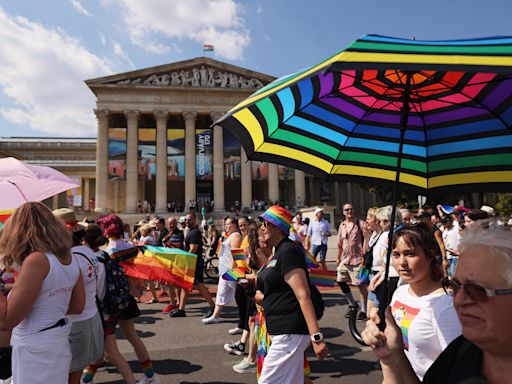Search results
LGBTQIA+ Stories from Yahoo
The term bisexuality is mainly used for people that have both heterosexual and homosexual attraction. [1] [2] [9] Bisexuality is one of the three main classifications of sexual orientation along with heterosexuality and homosexuality, all of which exist on the heterosexual–homosexual continuum.
- Overview
- It all started with a sex dream — does this mean what I think it means?
- Is there a quiz that I can take?
- Then how am I supposed to know if I’m bi?
- What’s the exact definition?
- What does being bisexual ‘look’ like?
- Is there anything that ‘causes’ bisexuality?
- What does this mean for my sexual and reproductive health?
- Do I have to tell people?
- What implications can come from not sharing?
A quiz can’t tell you if you’re bisexual, and bisexuality looks different for everyone. Instead, try asking yourself these questions. You can choose come out to someone you feel safe with, but only if and when you want to.
Entering your birth date, birth time, and birth city into an astrology website won’t tell you whether you’re bisexual.
Neither will a blood test, nasal swab, or online quiz.
The guide below on bisexuality, however, may help you answer that question for yourself.
A dirty dream featuring a hottie of a gender you don’t typically get down with can be hot (hello, sleep orgasm!).
But it can also be discombobulating. According to certified dream analyst Lauri Loewenberg, though, a sex dream alone isn’t reason enough to get your panties in a bunch about your sexuality.
“The only time a sex dream may give you some inclination about your sexual orientation is if before you had the dream you were already questioning your sexuality,” she says.
Otherwise, the sex dream doesn’t actually represent a physical or sexual want, but a psychological need.
While anyone of any gender can have feminine or masculine energy, “in dream psychology, the presence of a female in a sex dream suggests that you’re craving more feminine energy,” says Loewenberg. Meaning more nurturing, sensitivity, or creativity.
“And the presence of a male in a sex dream suggests you’re craving more masculine energy,” she says. Meaning more assertiveness, authority, or aggression.
Would it be great if you could take an internet quiz to get all the answers to your (bi)sexuality questions? It’d certainly make things easier for a questioning person like yourself!
But here’s the thing about (bi)sexuality: you don’t have to check off certain boxes or answer a set of questions a certain way to qualify.
So, no quiz can tell you whether you’re bisexual.
(And any quiz that claims to be able to tell your sexuality is full of sh*t!).
“Only you can determine whether bisexual feels like a label that best fits you,” says bisexual activist Robyn Ochs, editor of the anthology “Getting Bi: Voices of Bisexuals Around the World and Recognize.”
Bisexual activist Shiri Eisner, author of “Bi: Notes For A Revolution,” suggests asking yourself the following questions to determine if you’re bisexual:
•Does the term bisexual give me a sense of comfort?
•Does the term bisexual give me a sense of adventure?
•Is it fun for me to think about being bisexual?
•Does the thought of being bisexual or identifying as bisexual make me happy?
The mostly widely accepted definition of bisexuality is from Ochs herself.
It reads:
“Someone who is bisexual acknowledges in themselves the potential to be attracted — romantically, emotionally and/or sexually — to people of more than one gender, not necessarily at the same time, in the same way, or to the same degree.
“The ‘bi’ in bisexual can refer to attraction to genders similar to and different from one’s own. People who identify as bisexual need not have had equal sexual or romantic experience — or equal levels of attraction — with people across genders, nor any experience at all; attraction and self-identification determines orientation.”
You’ll notice that this definition does *not* state that bisexuality is an attraction to men and women.
While it’s certainly possible for those to be the two (or two of the) genders someone is attracted to, “bisexuality doesn’t state which genders you’re attracted to,” says bisexual activist Vaneet Mehta, creator of the hashtag #BisexualMenExist that went viral in spring of 2020.
“Despite many of the memes that would suggest otherwise, bisexuality doesn’t have a look,” says Mehta.
Once more for emphasis: Bisexuality does *NOT* have a look.
The question of what makes someone to be any sexuality is certainly an interesting one. Is it nature? Nurture? Some combination? Something else entirely?
The problem is this question is only ever asked about sexualities that *aren’t* heterosexual.
“[This question] is rooted in heterosexism,” says Ochs. “Because it assumes that heterosexuality is the default sexuality and only normal, and all other sexualities must have been caused by something going wrong or awry.”
“Nothing causes bisexuality any more than anything causes heterosexuality,” she says.
And to be very clear: Nothing went wrong or awry with anyone who is bisexual.
“There is nothing wrong with bisexuality,” says Eisner.
Your sexual orientation alone doesn’t have any bearings on your risk for sexually transmitted infections (STIs) or unwanted pregnancy.
It’s the sex you have, who you have sex with, and the precautions you take (or don’t take) during the sex you have to reduce those risks that have bearings on your risk for STI transmission or unwanted pregnancy.
Nope!
We live in a society where everyone is assumed to be heterosexual unless otherwise stated, says Rachel Wright, MA, LMFT, a psychotherapist, licensed marriage and family therapist, and sex and relationship expert.
Wright adds that this can make people feel like they have to share if they aren’t heterosexual. But this isn’t true!
“Your sexuality is yours to share when you want to, if you want to, with whom you want to,” she says. So if you never want to tell anyone, that’s your prerogative!
“Tell who you want to tell when your discomfort around them not knowing your sexuality begins to cause you more discomfort than the thought of them knowing,” she suggests. “You also want to have a good inclination that it’s emotionally and physically safe for you to come out.”
Signs someone will provide a safe, affirming place for you when you come out include they themselves being bisexual or them having a bisexual partner, child, or sibling.
Long term, not sharing your (bi)sexuality with people can have negative mental health effects, according to Wright.
“Not coming out can cause something called cognitive dissonance, which is the discomfort that occurs when who we are in our minds and who we are for the outward world are different,” she says.
“Cognitive dissonance can cause all sorts of mental health issues like anxiety and depression.”
Another consequence of not sharing your (bi)sexuality? It can lead you to feel shame around your sexuality when there’s nothing to feel ashamed of.
Understanding Bisexuality. The term “bisexual” is used to describe a person who experiences emotional, romantic and/or sexual attractions to, or engages in romantic or sexual relationships with, more than one sex or gender.
People also ask
Does bisexuality really exist?
Is everyone bisexual?
What does bisexual mean?
Is bisexuality an attraction to men and women?
- Being bisexual means different things to different people. Many people use “bisexual” as the umbrella term for any form of attraction to two or more genders.
- Some people see the term as reinforcing the gender binary. Does the term “bisexual” refer only to attraction to men and women? Some people see it that way.
- While others apply a broader meaning. Historically, the term bisexual has referred not to “men and women” but to “same and different” — as in, attraction to people of your own gender and to people with gender(s) different than your own.
- One thing everyone agrees on: being bisexual isn’t a 50/50 split. While defining homosexuality and heterosexuality might help you understand the definition of bisexuality, don’t make the mistake of thinking that bisexual people are “half gay” or “half straight.”
Aug 20, 2021 · Bisexuality is a sexual orientation, and bisexual (commonly abbreviated to “bi”) people are those who have the capacity to form attraction and/or relationships to more than one gender. Bisexual advocate Robyn Ochs’ popular definition of bisexuality is, “ The potential to be attracted — romantically and/or sexually — to people of ...
Jul 7, 2023 · Bisexual means attracted to multiple genders, while pansexual means attracted to all genders. For many in the LGBTQ community, these terms may overlap. Some people may identify as...
What does bisexual mean? In simplest terms, a bisexual person is someone who can be attracted to more than one gender; but adults and youth who identify as bisexual sometimes describe themselves differently. Many bisexual adults have embraced the definition proposed by longtime bisexual leader, national speaker and award-winning activist Robyn ...






